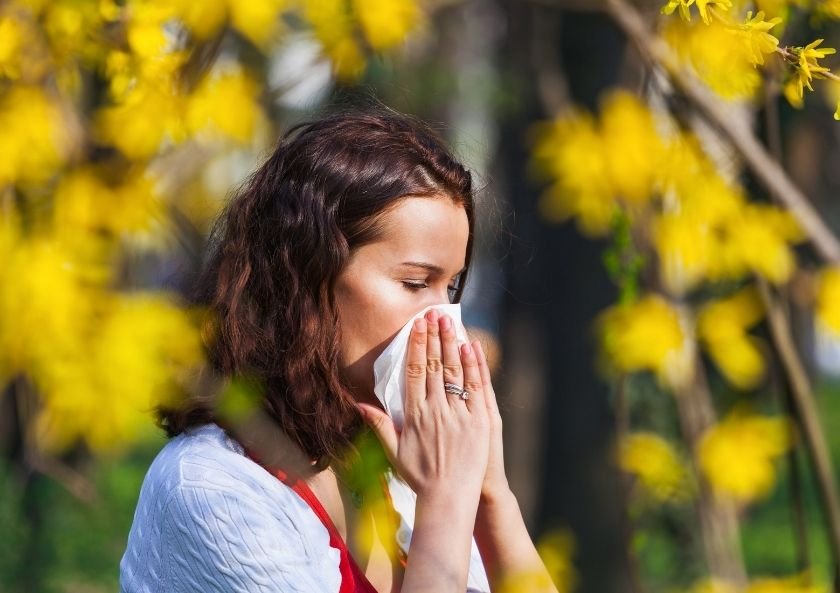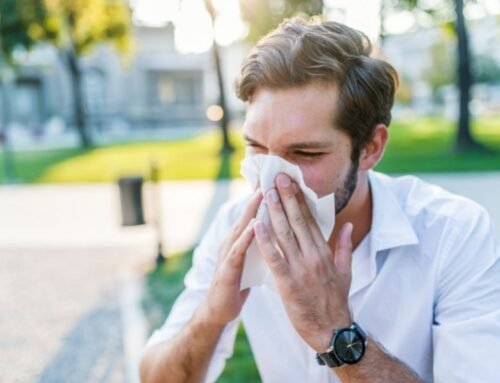If nasal itching and congestion complaints recur frequently and persist for more than an hour, it is called rhinitis. If this disease develops due to allergies, it is called allergic rhinitis (hay fever). Although it is not necessary to excuse hay for the emergence of their complaints, it is most commonly referred to as hay fever among the people. Allergic rhinitis (hay fever or allergic rhinitis) is accompanied by nasal discharge, itching, congestion and sneezing, and sometimes itching of the eyes. As in many countries, it is the most common allergic respiratory tract disease in adults in our country. In this article, all aspects of rhinitis will be given.
What is Allergic Rhinitis (Hay Fever) in Adults?
Although it differs between countries, Allergic rhinitis (hay fever) is the most common allergic respiratory tract disease.
We call allergic rhinitis or hay fever to the allergic inflammation of the nose, which manifests itself with runny nose, itching, congestion and sneezing for more than 5 consecutive sneezes due to the damage caused by allergens such as house dust, cat, dog, mold or pollen. It may be associated with allergic conjunctivitis (eye flu), allergic sinusitis or asthma. It is generally seen in two forms, seasonal or year-round.
Seasonal allergic rhinitis symptoms can occur in spring, summer and early autumn. It usually develops due to an allergic sensitivity to mold spores and pollen from grass, trees and weeds.
Symptoms of year-round allergic rhinitis continue throughout the year and are usually caused by dust mites, pet hair or cockroaches or mold spores. Sometimes underlying food allergies can also rarely cause prolonged nasal symptoms.
What is its frequency?
Allergic rhinitis is the most common allergic disease among allergic diseases, especially in adults. Us against the allergic rhinitis at different rates in many countries in the world as the regional average varies between 10% and 20% in Turkey is seen in one out of every 5 adults together.
Allergic rhinitis manifests itself in the form of sneezing, runny nose, itching and nasal congestion, especially when waking up in the morning or when it goes outdoors in spring.
Especially when the spring comes, complaints of patients with pollen allergy such as sneezing, runny nose, itching and nasal congestion repeat increasingly every year.
Is It An Important Disease?
Allergic rhinitis is a serious health problem that affects both the health and social life of adults and disrupts the quality of life. Allergic rhinitis is just a runny nose, itching, congestion and sneezing.
What Are The Diseases Associated With Allergic Rhinitis?
As it is known, allergic rhinitis causes itching in the eyes and allergic conjunctivitis due to its effects on other organs. In addition, it causes recurrent sinusitis, formation of flesh in the nose (nasal polyp), otitis media, hearing impairment, sleep apnea and other diseases such as asthma. In addition to allergic rhinitis complaints, complaints related to damage to other organs are added over time.
Since allergic complaints affect many organs, gastroesophageal reflux and digestive system complaints are more common in allergic people. Because it disrupts the quality of sleep, it can lead to sleep apnea in later years and hypertension or cardiovascular diseases may develop in the brain and other organs after breathing stops.
Allergic rhinitis disrupts the work and school concentration and sleep patterns of the person due to the continuation of these complaints for a long time, except for itching in the nose, stuffy discharge and sneezing complaints.
In working life, it affects the job success of individuals negatively and their dialogue with them. It negatively affects school and classroom success, especially in childhood.
Patients with disrupted sleep patterns may lose concentration in tasks that require attention, and can lead to accidents in traffic that require attention.
Causes of Allergic Rhinitis in Adults?
Allergic rhinitis, which is very common in the society, is caused by pollen from grass, trees and weeds, pet hair or feathers, allergens such as house dust mites and mold, and it can lead to an increase in allergic complaints from irritants such as cigarette smoke, perfume and diesel exhaust.
How Does It Develop?
In allergic rhinitis, as in other allergic patients, it occurs due to a genetic predisposition in the person and an impaired immune response with the contribution of environmental factors. Allergy is an undesirable, harmful excessive response of the body’s immune system against substances called allergens that enter our body from the external environment.
Allergens are foreign substances that cause allergic diseases. Allergens are harmless to most people. They cause diseases in atopic individuals who have allergic diseases in their family and who have an inherited tendency to develop allergies. In allergic diseases, there is a cause and effect relationship, which is often noticed by the patient, between the encounter with the allergen and the emergence of complaints. Complaints begin when the patient encounters the allergen to which he is sensitive. For example, in those with hay fever and allergic conjunctivitis, when they encounter pollen in spring, they experience watery eyes, itching in the nose, discharge and sneezing. The most important allergens we encounter throughout our lives are house dust mite, pollen, mold spores and animal hairs in the inhaled air.
What is the Most Important Reason?
The most important reason is genetics. Adults who have any allergic diseases in their mother, father, sibling or children are more likely to develop allergic rhinitis at some time in their lives. For this reason, adults with allergic diseases in their family should be examined for the diagnosis of allergic rhinitis if they have symptoms such as nasal discharge, congestion, itching or sneezing.
In many studies, male gender, the presence of allergic diseases in the family, the presence of respiratory allergies in childhood, or food allergy in childhood, living in a humid and moldy environment for a long time, being an only child or low number of siblings, the child being born in the spring and summer, living in a green area or living in areas with high air pollution and living in a highly accepted hygienic environment have been shown as important risk factors for the development of allergic rhinitis.
Which Allergens Cause Rhinitis?
Although we encounter countless allergens throughout our lives, the main allergens that cause allergic rhinitis are house dust mites, pollens, molds, allergens of pets such as cats and dogs, and cockroach allergens. Often encountering these allergens in our environment causes allergic rhinitis.
Strong smells such as smoking, perfume, hair spray and smoke, make-up materials, laundry detergents, cleaning solutions, pool chlorine, car exhaust and other air pollutants are also agents that trigger the emergence of allergic rhinitis symptoms.
Can It Be Allergic Rhinitis If I Have Asthma?
The association of allergic rhinitis in adults with asthma is up to 60% -80%. Therefore, adult patients with asthma have a prior history of allergic rhinitis. It should be questioned whether patients who are followed up with a diagnosis of asthma have allergic rhinitis.
How Does Cigarette Exemption Affect Rhinitis?
Smoking causes many problems in our life. Exposure to cigarette smoke increases both the severity of the allergic disease and the sensitivity to the allergen. Some scientific studies have shown that maternal smoking only increases the risk of developing allergen sensitivity in children with a family history of allergic diseases. Allergic rhinitis is likely to develop, especially if the child was smoked at home for the first year after birth and the child was exposed to cigarette smoke. Unfortunately, these children have a higher risk of developing allergic rhinitis and asthma in the future.
There is a definite relationship between smoking and the occurrence of allergic sensitivity and future asthma. For these reasons, whether or not there is allergic asthma, we should direct them to quit smoking and ensure that they are protected from second hand smoking.
What are the Symptoms of Hay Fever?
Although house dust molds or cat and dog allergens that we come into contact with pollen in the spring months or all year round cause complaints, especially in the nose, rhinitis has an effect on many organs.
What are the Symptoms of Allergic Rhinitis?
The main symptoms of allergic rhinitis are 5 or more sneezing, runny nose, itching and nasal congestion.
Apart from that, he has many other complaints. Especially in patients with long years of rhinitis, other complaints arise due to damage to other organs.
What Are These;
- It is said by the patients as sputum that does not end in the throat.
- Cough occurs over time with postnasal drip in patients whose complaints continue for many years.
- Fatigue is one of the most important complaints in patients whose sleep patterns are disrupted.
- Nose bleeding can be seen as a result of the damage in the nose.
- Learning difficulties are more common in many patients with concentration disorder, especially in childhood.
- Eye watering, itching and conjunctivitis develop due to the damage caused by allergy in and around the eye.
- Frequent sinusitis is due to damage to the sinuses with rhinitis in the respiratory tract
- Bad breath is always accompanied by nasal discharge, especially in patients who breathe through the mouth at night.
- The decrease in hearing is associated with allergic rhinitis due to the damage done by the allergy on the ear.
- Taste and smell disorder is seen with nasal congestion.
- Itching in the throat and frequently recurring pharyngitis also develops due to mouth breathing.
- Tooth decay is more common in adults due to mouth breathing as in childhood.
- Shortness of breath and wheezing are seen when asthma complaints start due to the effects of hay fever on the lower airways.
- Snoring is one of the common complaints especially in patients who breathe through the mouth at night. In the following years, we may encounter with stopping breathing during sleep.
Allergic Rhinitis Affects Learning And Concentration!
Adult patients often cannot sleep comfortably due to nasal congestion, discharge, itching and repeated sneezing. Some patients have to wake up from sleep at night, some patients jump up at night due to snoring complaints and then fall back to sleep. Patients with allergic rhinitis who cannot get a full night’s sleep get up late in the morning as a result of this, they have learning difficulties and difficulty concentrating in their work lives.
Is Allergic Rhinitis or Flu Frequently Confused?
Rhinitis is often confused with flu symptoms during the winter months. It is difficult to distinguish between the two diseases. Although adult patients have allergic rhinitis, they may be evaluated as an upper respiratory tract infection many times and may have to use the wrong medications and even antibiotics unnecessarily. Frequently confused rhinitis and flu can actually be easily separated by allergists and unnecessary medication use is prevented.
Can Allergic Rhinitis Symptoms Vary According to the Seasons?
Symptoms of rhinitis or hay fever increase in the spring months due to pollen. In addition, although house dust allergy causes complaints throughout the year, it can lead to an increase in rhinitis complaints especially in spring and autumn during the transition months.
Does Allergic Rhinitis Cause Sleep Apnea?
In adults, allergic rhinitis can lead to sleep disturbances or emotional problems and problems with social activities. The frequency of snoring at night increases in allergic rhinitis. Snoring in adult patients with allergic rhinitis is a further risk factor for obstructive sleep apnea syndrome, and studies with polysomnographic measurements have been found to be associated with increased sleep apnea-hypopnea index in patients.
When Should Allergic Rhinitis Consider in Adults?
As it is called among the people, it is seen as hay fever or allergic runny nose, itching, congestion and sneezing. Allergic rhinitis often comes to the flux of patients whose complaints continue, but in which situations should we consider rhinitis?
In what case should an allergy come to mind?
- Complaints often occur in contact with the allergen at certain times or in environments such as workplace, home, park, garden.
- Itching and discharge in the nose, throat and ears.
- Stinging repeatedly, sometimes more than 10 in a row
- Having a transparent and abundant nasal discharge like water,
- Accompanying complaints of itching, redness and watering in the eyes.
- Occasional obstruction in the nose, which may be unilateral, sometimes on the right side and sometimes on the left.
- Fever does not accompany his complaints. Sometimes there may be a slight temperature increase, but there is no 38.5 degrees fever.
- Complaints usually last a few days a week and are prolonged, sometimes during all season months.
- Food allergy, eczema on the skin or urticaria (hives) attacks in the past, or simultaneously in childhood.
- Presence of people with similar complaints in the family or relatives, especially siblings, parents and relatives.
- Having long lasting cough attacks with recurrent sinusitis and bronchitis.
suggests that you may be allergic.
What should we do if we have symptoms of allergic rhinitis?
Apart from this, hay fever can also manifest itself in the form of nasal discharge, snoring, stopping breathing during sleep, bad breath, loss of smell and taste, and itching in the eyes and throat. Frequently recurring sinusitis may occur with otitis media, pharyngitis and asthma. We tried to inform them about what to do and where to go if they have symptoms of allergic rhinitis.






